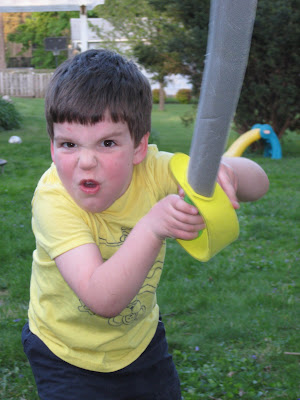Every mom hears this litany from time to time. For me, it happens when the kids walk in the door from school or during my first few minutes in the door. I have three of them (amazing, hilarious, talented... and talkative!), and my husband and I work hard to make our home a place where they can feel safe and listened to -- especially when the world outside feels unfriendly.
 But hearing everything bad that happened in a day, from a broken shoelace to a broken friendship, all at once, right as you walk in the door can feel overwhelming... leading AnyMom or AnyDad to ask themselves silently, "They were so cute as babies... So quiet. Why, exactly, did we teach them to speak?" (Oh, stop your judging... you don't say it out loud, but you know it's true.)
But hearing everything bad that happened in a day, from a broken shoelace to a broken friendship, all at once, right as you walk in the door can feel overwhelming... leading AnyMom or AnyDad to ask themselves silently, "They were so cute as babies... So quiet. Why, exactly, did we teach them to speak?" (Oh, stop your judging... you don't say it out loud, but you know it's true.)
Seriously, though, the question then becomes: how to turn the barrage of negative talk in a positive direction? Do I have to be the kung fu master of child development? Do I arm myself with a teflon super shield that sheds negative energy? Do I take it all in? Do I ignore? (Do I lock myself in the bathroom for ten minutes of peace?)
The answer -- for me, at least -- is... a little bit of each. Yes. Including the bathroom. (I call it my 'home office', as in "I have an important meeting. If you need me, I'll be at my home office.")
Here are a few strategies that may work: (Throw them at the wall and see what sticks.)
Divide and Conquer: Learn a lesson from the old West: one animal is easier to handle than an entire herd. Give each child a little one-on-one time that they can count on, maybe associated with a ritual activity like doing homework, driving to an activity, setting the table or getting ready for bed. Use that as the time to share the day's stresses. Instead of feeling overwhelmed, each parent can really listen. Reliable alone time can help your child feel valued and give you both the space you need to talk about issues that matter.
Start Happy: Set a family goal to start with something new or amazing or cool when we talk about what our day was like. I redirect the wave of troubled talk often with these phrases, "Tell me something happy from your day." and "What did you learn today?" Do it often enough, and the kids know that they'll get as much (or more) attention by sharing something positive. (The habit of thinking positive first is a great one for moms and dads, too.)
Step Back, Be Brave: Sometimes, the result of having an open, listening household is that there can be challenges to our own way of doing things. (The complaint isn't always about the kids on the bus.) Being open enough to hear without dismissing, deflecting or defending takes parental bravery. (I'll admit, this is something I have to work on. It's tough, especially now that my oldest is a 'tween'.) And one way to handle difficult conversations or feedback constructively can be to reframe a contentious issue in general enough terms to make it less personal. Asking open ended questions is a great means to do that. A useful book that teaches this skill (the hubs and I read it often) is Raising an Emotionally Intelligent Child: The Heart of Parenting by John Gottman. I'd highly recommend it to any mom or dad.
Be Thankful: Every so often, we take time at a shared meal or in the car or at prayer time to say something we're thankful for. Often, it can be an affirming time in our family. I hear my kids say how thankful they are for a small kindness one did for another, and we can openly express how glad we are for our time together. Every time we talk about being grateful, we are focusing on a small happiness in our life. And that focus helps us weather the not-so-good moments a little more resiliently.
In the end, a little positivity helps our whole family -- especially when life happens, unexpectedly.
What works for yours?
- Midwest Mom

